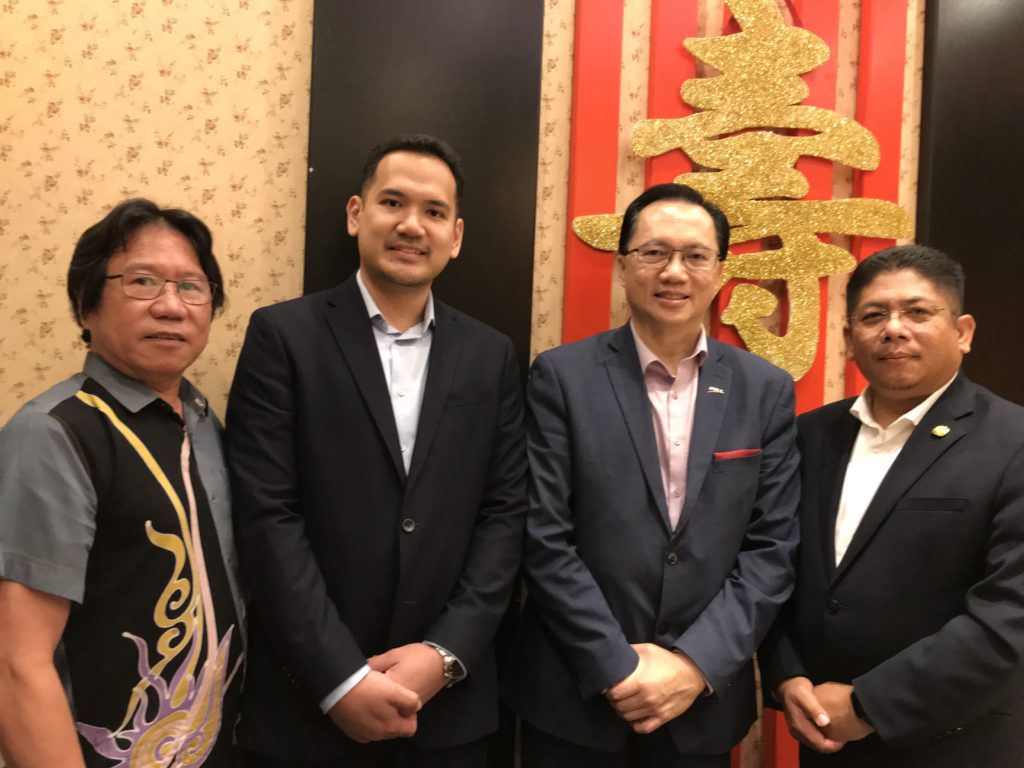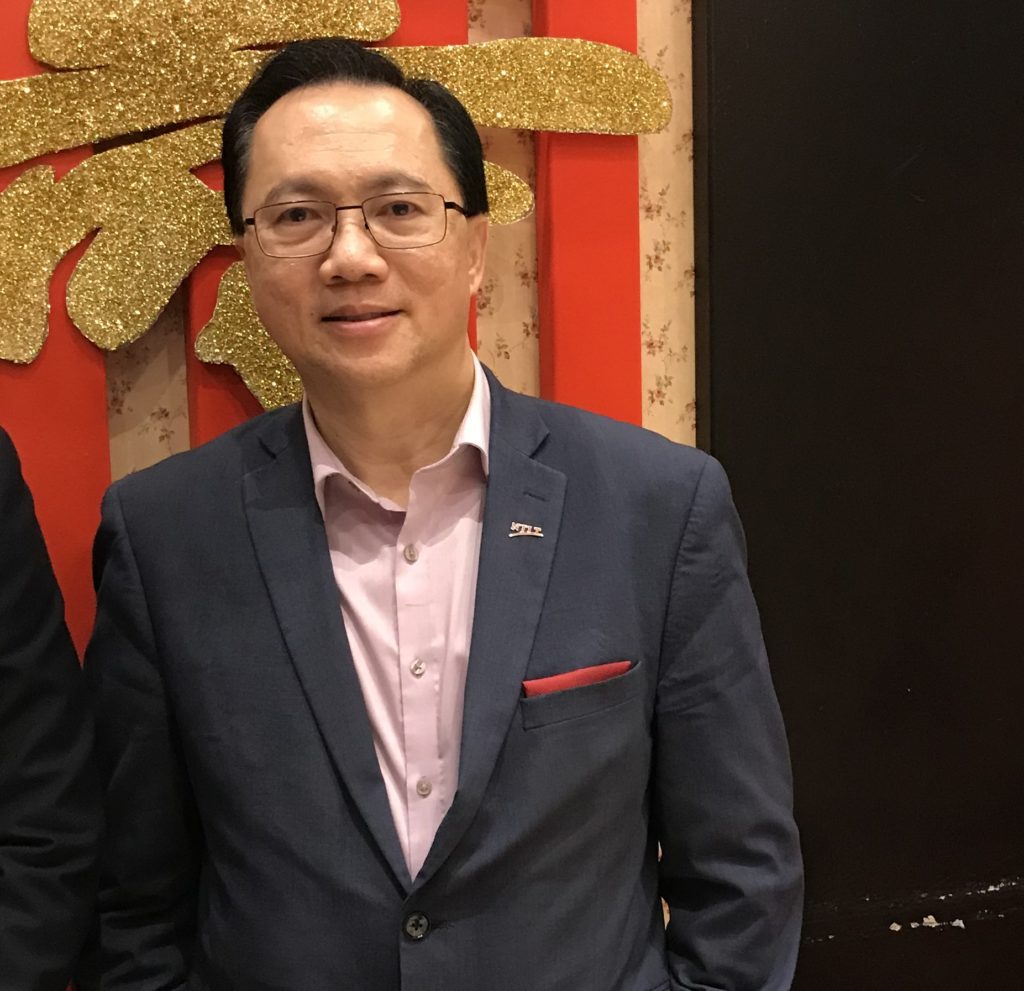
From Left: New Jersey businessman Kirby Tan, Malaysian consul in New York Mohammed Iylia Omar, President of NJIT Prof. Teik C. Lim and Malaysian vice consul
By Manik Mehta

NEW YORK, Aug 10 – The Malaysian diaspora on the U.S. east coast burst into a chorus of cheering over the first-ever appointment of a professor of Malaysian origin as the president of the prestigious New Jersey Institute of Technology (NJIT) which is located in Newark, New Jersey.
Teik C. Lim who was recently appointed President of the NJIT, is a distinguished professor of
mechanical engineering. Prior to this appointment, he served as the interim president of the
University of Texas in Arlington (UTA), where he was also attached as a professor in the
Department of Mechanical Aerospace Engineering.
“Yes, we are very excited and proud of Professor Lim’s appointment as President of the NJIT,”
said Kirby Tan, a New Jersey-based businessman and a Malaysian community leader who
hosted a dinner in honour of Lim and also invited other Malaysians, including the Malaysian
consul in New York, Mohammed Iylia Omar, and the MIDA director Nelson Samuel.
Lim, 57, who has acquired U.S. citizenship, was born in Negeri Sembilan, Malaysia, and
is married with three adult children. Lim was appointed after a nationwide search by the NJIT.
He succeeds Prof. Bloom, who is widely credited with building NJIT into what it is today: one of
the finest STEM schools in the country. Bloom served as university president in the past 11
years.
Robert Cohen, chair of NJIT’s board of trustees, said that Lim had “incredibly impressive
credentials” as a scholar and senior administrator, Ras Baraka, the mayor of Newark, where the NJIT is located, was “very pleased” with Lim’s appointment; the mayor had worked closely with Lim’s predecessor, former NJIT President Prof. Bloom who retired, mandating the NJIT to search for a successor.
The mayor was “excited” about Lim’s intent to continue building upon the already strong relationship between the city of Newark, its residents and the NJIT.
“Dr. Lim has an extensive background as an academic, an innovator and a leader, and I welcome him to Newark and to NJIT. I look forward to working closely with him to further the university’s mission of excellence and innovation to students, learning, scholarly research, investments and our community.”
Indeed, New Jersey Governor Phil Murphy also welcomed Lim.
“I applied for the position and was eventually selected as NJIT’s 9 th President,” reminisced Lim in
an interview with Weekly Echo on the sidelines of the reception hosted in his honour by Kirby
Tan.
Lim, who assumed office in July, is the first Malaysian – indeed, the first Asian – to be selected
the NJIT President. Until his appointment, all his predecessors had been Caucasian. This was
also seen as “one more reason to celebrate”, as one Malaysian guest put it.
Prior to the interim presidency at UTA, Lim was the university’s provost and vice president for
academic affairs from 2017 to 2020. Before joining UTA, Lim spent approximately 15 years at
the University of Cincinnati, Ohio, where he held both academic and administrative
appointments, the last of which was as dean of the College of Engineering and Applied Science.
As UTA’s interim president, Lim is credited with guiding the university through the COVID-19
pandemic while increasing student success metrics such as degree attainment, student
population diversity and graduation rates. He also led the effort to achieve Texas Tier One
status, making UTA only the fourth institution in Texas to earn this distinction reserved for elite
national research institutions.
Lim earned a Bachelor of Science in mechanical engineering from Michigan Technological
University, a Master of Science in mechanical engineering from the University of Missouri-Rolla
(now the Missouri University of Science and Technology) and a Ph.D. in mechanical engineering
from the Ohio State University.
As a scholar, Lim has published 158 refereed journal papers, presented 94 refereed conference
proceedings and delivered nearly 140 conference presentations and invited lectures or
seminars. Lim is a fellow of the National Academy of Inventors, the American Society of
Mechanical Engineers and the Society of Automotive Engineers International, as well as a
Licensed Professional Engineer.
Asked to define his vision for NJIT, Lim told this correspondent that he would like to make NJIT
a “highly inclusive and welcoming place”. “Talent is everywhere but opportunity is not,” he
spoke in a somewhat Solomon-like tone, adding that he would like to make NJIT “an engine for
social mobility”.
“We are also embarking on a digital transformation to incorporate technology and digitally-
enabled environment. The students need to acquire power skills through which the students
can effectively collaborate and become flexible and resilient …” Lim observed, pointing out that
the NJIT is dynamic and diverse in terms of race, social and geographic backgrounds. “Diversity
is the hallmark of success,” he emphasized.
When prodded to speak about his qualifications that appealed to the NJIT board, Lim revealed
that his background and humble beginnings along with the use of education to improve the
lives of others, may have been key to his selection.
Lim has coined the mantra “IDEATE”, the acronym which translates as: I for Infrastructure
blending digital and physical infrastructure;; D = Diversification of revenue sources; E =
Enrollment strategy-basing growth on degrees, discipline and modalities for all students; A =Advancement, including philanthropy and engagement; T = talent and teamwork; and E +
Excellence in equity.
He plans to direct efforts to creating opportunities for the next generation; he envisaged
students having graduated with STEM degrees to rise. Success would be measured by the
impact of the graduate students on society. “We’ll train our STEM students to bring joy in life,”
the professor said.
Among his priorities would be to formulate a strategic plan for NJIT to reflect on the new
circumstances created by and lessons learned from the COVID-19 pandemic; equally important
would be embracing the digital revolution taking place in higher education. Using NJIT’s
location in a highly industrialized setting, efforts would be directed at creating mutually
beneficial private-public partnerships aimed at enriching the experience and education of
students.
Did he have a message for Malaysians back home? “Yes, I would urge them to make an impact
on society. By helping others to be successful, they help themselves to be successful. Strive for
excellence … and always give your best. Empathy is important and you need to give back to
society,” he said, adding that he would encourage the Malaysian government to invest more in
education. “Holistic education is needed by Malaysian students.”
–WE